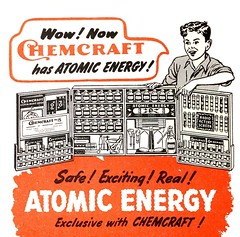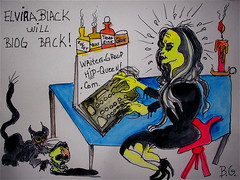Although it now has some hefty competition, CBS's
60 Minutes is still, to my mind, the best of the TV newsmagazines. Maybe one of the reasons I don't watch it too often anymore is that I typically come away from the program ranting and muttering to myself over some horrible injustice and/or outrage that Morley Safer and company have unearthed. Exactly what do I do with all this frustration and fury other than watch my blood pressure rising?
But this past Sunday's segment--entitled
"The Worst Case Scenario"--left me with more than a feeling of impotent rage. It gave me a rare impetus to want to do more than just kvetch to myself. I think a quote from the segment's intro by Ed Bradley might be appropriate here, so here goes:
We can no longer ignore the worst-case scenario of a nuclear terrorist attack on an American city. Osama bin Laden has made it clear he wants to obtain nuclear weapons and use them against us.
The 9/11 Commission considers such an attack the No. 1 threat today, not because it is the most likely disaster scenario, but because it would be the most devastating. The chairman of the 9/11 Commission even says he expects to see such an attack on an American city in his lifetime.
Hundreds of thousands of people could die in a nuclear attack, but hundreds of thousands of others could be saved. That's because the Pentagon--after decades of searching--believes it has found a drug to treat radiation exposure. Why isn't that drug available?
Well, I have an answer to that. It seems to have a lot to do with one Stewart Simonson. He's the Assistant Secretary for Public Health Emergency Preparedness in the Department of Health and Human Services. Rather than make a radiation drug available to a large number of potential victims in major cities, Simonson seems to think that in the event of a nuclear attack, victims bleeding to death can simply be treated in hospitals.
Does any of this sound sickeningly familiar to you all? Can you say "Katrina," "FEMA," and "Michael Brown?"
In case the situation isn't crystal clear, I'll quote a Fox News.com/AP piece from February 2nd for emphasis:
National Intelligence Director John Negroponte said Thursday that the Al Qaeda terror nework remains the "top concern" of the U.S. intelligence community, followed closely by the nuclear activities of Iran and North Korea....
"Iran already has the largest inventory of ballistic missles in the Middle East," Negroponte said.
Meanwhile, he said that North Korea's assertions that it has nuclear weapons are "probably true."
Back in 1951, a civil defense film called
Duck and Cover, produced in cooperation with the Federal Civil Defense Administration, was released showing schoolchildren what to do in case of an atomic attack. In it, a cartoon character named Bert the Turtle was employed to demonstrate to children how to "duck and cover" if they see a flash in the sky indicating that the Soviet Union has just delivered us a little gift to remember them by.
Looking at this film now (you can view it
here), it seems hopelessly corny, quaint, and naive.
In the film, kids are told that there are two possible nuke attacks--one with prior warning, and one without. In case of the latter, when one sees a very blinding light, one should try to quickly get to the relative safety of the side of a building or even a street curb, sort of roll up into a ball covering your face and back of your neck, and "stay covered until the danger is over." This will prevent that pesky radiation burn, which is "worse than a terrible sunburn." If possible, cover yourself with a coat and your hand so as not to be burned--even a thin cloth or a newspaper.
To my mind, Simonson--"a Republican political appointee" and former "lawyer for Amtrak"-- is the Bert the Turtle for the new millenium. Instead of merely addressing guileless children, his message to every man, woman and child in our country is to crawl to the nearest hospital--and whether or not you make it there, it's pretty damn certain you'll be kissing your barbequed ass goodbye either way, so may as well take your time. (Remember how effective the hospital service was during Katrina? Imagine what it might be like during a nuclear holocaust).
Here's the
60 Minutes story in a nutshell. (Note: all quoted material unless otherwise noted is from the
60 Minutes transcript).
Hollis-Eden, a "small biotech company in San Diego" which had developed a drug which could serve as a "possible treatment for radiation sickness," was approached by the military in the summer of 2001. According to Bob Marsella, VP of the company, they were told during this visit that "we've been testing your drug and we've been looking for a drug like this for 40 years.'"
Two weeks after 9/11, the military came again and said they'd be interested in developing the drug for civilians as well as troops.
Marsella and his boss, Richard Hollis, did the numbers and realized that the potential market for their product could be huge--in the millions of units. They set about "circulating in Washington" trying to get investors in Washington who would get behind the drug.
But it was no go until President Bush's 2003 State of the Union speech. In it, he announced a new initiative.
'Project Bioshield' provided nearly 6 billion to create a biodefense industry. The program gave drug companies a powerful incentive to come up with new drugs to be used in the event of terrorist attacks. For the first time, there would be a guaranteed market for drugs if they tested successfully. It was the assurance Hollis-Eden had been waiting for....
With the prospect of a huge market, investors put money in the company and Hollis-Eden's stock soared from $5 to $35 a share....
Over the next three years, Hollis-Eden spent more than $100 million, with the expectation that the government would buy millions of doses.
And the beauty part? The new drug, Neumune, could actually be self-administered in the event of a nuclear attack.
So how does Simonson the Turtle--the man who oversees Project Bioshield-- shine in? Well, I'll tell you how. This past September, "the Department of Health & Human Services surprised everyone by announcing that it would commit to purchase a radiation drug from whichever company had the best product, but only 100,000 doses." Hollis-Eden's stock, needless to say, quickly plummeted.
"Assistant Secretary Simonson has been under fire for committing nearly a billion dollars to acquire a controversial new anthrax vaccine, but he has been given credit for successfully stockpiling drugs for smallpox."
Representative Tom Davis, a Virginia Republican who chairs the Committee that oversees Project Bioshield, feels that Simonson is "over his head" regarding this issue. Comparing him to Michael Brown, he observes that he has exhibited "the same kind of arrogance, a lack of expertise. This is a serious job at this point, and I think we need to have professionals filling it, not political appointees." As a matter of fact, Davis, who generally supports the Administration, called for the removal of Simonson from Bioshield in this
60 Minutes story.
It may come as a shock to learn that Simonson declined a request for an interview, but sent his deputy, Dr. William Raub, to be grilled by Ed Bradley. Here's a little of the back and forth, just for a goof:
Bradley: Why did the government decide to buy only 100,000 doses to treat acute radiation syndrome?
(DUCK...)
Raub: Well this is the place to start and we don't see 100,000 as the end, we see 100,000 as the beginning.
(AND COVER...)
Bradley: So if you order 100,000 and there's a nuclear explosion...when do you get the rest of them?
(DUCK...)
Raub: Again, we take this a step at a time. First off, we need agents that we can be sure will work.
(AND COVER...)
The Pentagon continues to endorse the drug. Meanwhile, Simonson "wrote a letter to congress empasizing that nuclear victims bleeding to death could be treated in hospitals."
In response to the question concerning whether he thought hospitals would be able to respond adquately to such an event, Raub stated, in part: "By no means would there be the ability to treat all of it, and therefore that's what makes it a catastrophe."
(DUCK....)
In response to Bradley's information from a top hematologist who estimated that perhaps dozens of people could be treated, rather than hundreds of thousands, Raub said: "But no one has ever claimed a perfect response here."
(AND COVER...)
Bradley: Do you imagine what it would be like to evacuate New York City?
(DUCK...)
Raub: ...this is a catastrophe and I think people would do their very best on under those circumstances.
(AND COVER...)
For those of you who did not see the show, all I can do is note the fear and loathing I felt when
60 Minutes offered a clip of Simonson in action. The look on his irritated, arrogant face filled me with the same sort of fury as did the clueless, befuddled mug of Michael Brown several months ago.
Perhaps Simonson has some personal strategy for surviving a nuclear attack. Maybe he'll be safely ensconsed in the "shell" of some government bunker, away from the flying debris and radiation. Maybe he has no wife or children to worry about. Perhaps he lives down the block from a hospital and plans to be the first on line for "treatment."
But for the rest of us, I think duck and cover and crawl to the hospital -- especially if there's a drug that could save countless lives--is not sufficient.
If anyone can offer any suggestions about if and how the average citizen might bring pressure on our Administration to oust this smug, clueless little turtle of a man, I'd appreciate it.









